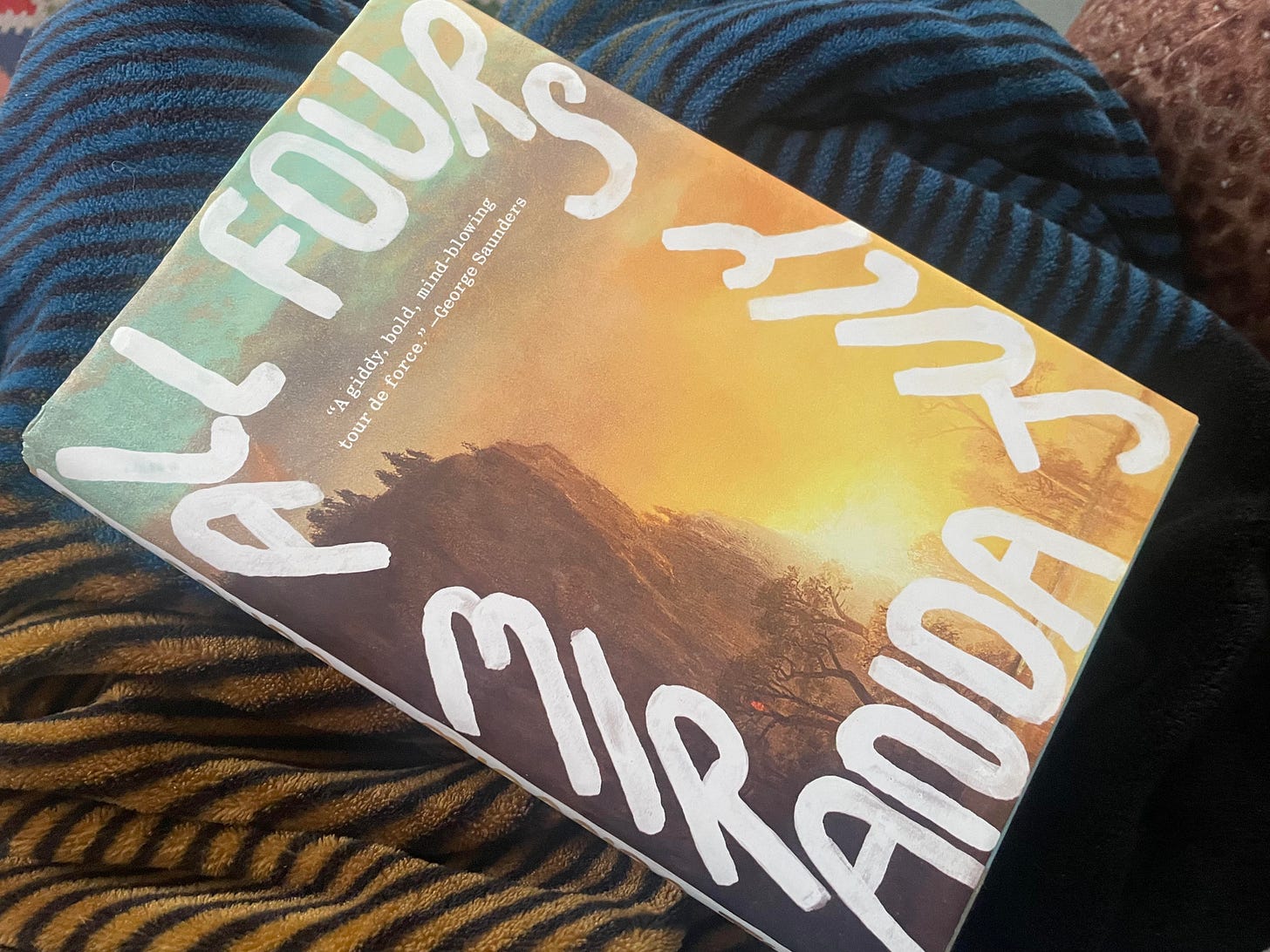Artist Miranda July’s All Fours will have you furiously marking gorgeous passages while sniffling or snorting. It’s a powerfully honest novel about the singular but largely universal midlife experience leading up to “the change.”
All Fours is like the Rabbit, Run for perimenopausal Gen-X and millennial women, nonbinary folks born with ovaries, and trans men. Whether or not that sentence means anything to you, please read on.
You probably know Miranda July for her famed 2005 indie film Me and You and Everyone We Know. And while All Fours is not autobiographical, July shares biographical details with the 45-year-old nameless main character, a “semi-famous” artist type with at least one big hit under her belt.
She sets off on a road trip from L.A. to N.Y., leaving her husband and seven year old at home, but only makes it a short drive away before she has what I would call a midlife crisis, but is more of an emotional midlife realization. She meets a younger man and employs his wife to elaborately decorate her motel room. It become an art installation, a holy refuge for the artist, and a wishful love nest for her and the woman’s husband.
Forget the premise though. The framework isn’t exactly what matters. All Fours is a cinematic, textured journey that lays bare physical changes and emotional unraveling from hormonal fluctuations caused by perimenopause. It’s also an exploration of the life-changing realizations that happen along the way. She shows the toll that these profound shifts can take on our inner world and relationships, and most importantly, how we see and soothe ourselves.
Read: Perimenopause anxiety is different than my regular old anxiety
July’s character realizes her beauty, physical strength, and sexuality are in flux, all things that give us such a sense of self, satisfaction, and validation in our younger years. The end of youth demands that she remind herself that she is still the same person she was before. She reminds herself through her feelings for this younger man. It’s validation at a moment where she feels she’s losing her value.
Middle age also starts to highlight the ill-fitting aspects of tradition and domesticity. Things that once felt uncomfortable now seem unbearable, and she feels the need to rip apart and reshape them. And she does that with her marriage, both in the book and in real life.
The idea of freedom lost and freedom desired is centered around sexuality, but what the character wants is actually more expansive that that. Desire is her life raft, it’s a self-preservation tool, it’s all about her, not them.
I don’t know if the Audra character is someone that July knows IRL, but she’s definitely a literary device that leads July’s character toward understanding and accepting her evolution. She embraces her future crone and finds out that loose skin can feel good, too! The character’s interaction with the older woman creates the sort of absent menopausal mythology July mentioned in a Guardian article:
“I came to think it was the mythology that’s missing. The many varied and contradictory accounts that ultimately create the picture of an important time.” When we get our periods we’re told we’re becoming a woman. What do we become when we hit menopause? “No,” she lifts one finger, clarification, “when we get our periods we become a woman for men, because that’s when we can procreate. Now, we become a woman for ourselves.”
This is a kind of spoiler but throughout the book, you’re waiting for her to meet a superstar, Arkanda, presumably for a creative collaboration. She’s so deeply distracted that work has taken a backseat to her emotional evolution. So, once she finally meets her, you find out that Arkanda just wanted to discuss their terrifying, similar birthing stories. It highlights that her role as a mother is her anchor — not lover or even artist (though the book is evidence that art is the force of reconciliation). Her descriptions of parenting show the deep, almost religious connection she has with her child who is magical in the way children are. July’s most raw, funny writing is about her fascination with Davey, but her most poetic writing is about her child.
The main takeaway is not just buckle up for perimenopause, but if you can tolerate hormone therapy do it, it helps. There are underpinnings of start lifting heavy weights before your hormones change and don’t forget to dance. Also also definitely, don’t forget to buckle up.




